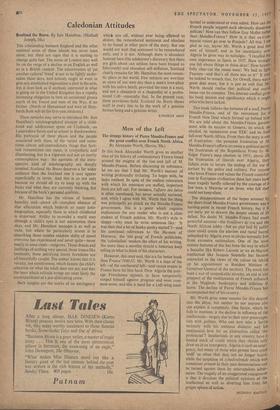Caledonian Attitudes
Scotland the Brave. By lain Hamilton. (Michael Joseph, 16s.) THE relationship between England and the other national areas of these islands has never been static, but there are signs that it is starting to change quite fast. The status of London may well be on the verge of a decline in an English as well as in a British context. The adumbration of yet another cultural 'trend' is not to be lightly under- taken these days, and nobody ought to want to give any established regionalisni a shot in the arm, but it does look as if anybody interested in what is going on in the United Kingdom has a rapidly increasing obligation to turn an occasional glance north of the Tweed and west of the Wye, if no farther. (North of Hampstead and west of Shep- herds Bush will do for first-year students.)
These remarks may serve to introduce Mr. kin Hamilton's autobiographical account of a child- hood and adolescence spent on Clydeside, on Lanarkshire farms and at school in Renfrewshire. His portrayal of these places and the people associated with them, of the varied and some- times almost self-contradictory things that Scot- tish romanticism can mean, is sympathetic and illuminating, but in a vigorous and not an inertly contemplative way : the egotisms of the intro- spective kind of autobiography are sharply avoided. Scotland the Brave deserves a far wider audience than the localised one it may appear superficially to invite. And this is so not only because we should all try to keep up with the Jocks and what they are currently thinking, but because of the book's personal qualities.
Mr. Hamilton has the virtues of honesty, humility and—above all—complete absence of that affectation which bedevils so many auto- biographies, especially those in which childhood is important. Ability to re-evoke a world seen through a child's eyes is not uncommon these days, and Mr. Hamilton manages it as well as 'most, but where he particularly •scores is in describing those sudden random shifts of mood everyone has experienced and never quite—never nearly in some cases—outgrows. Those dreads and loathings of nothing very special, those trance-like lassitudes, those petrifying lonely boredoms are ' all beautifully caught. The author knows that it is vacuity, not sensitiveness, which fastens the child's attention on what the adult does not see, and that the tears which solitude brings are most likely the accompaniment of a jaw-dislocating yawn.
Such insights are the marks of an astringency
which sets off, without ever being allowed to distort, the remembered sentiment and idealism to be found in other parts of the story. But one would not wish that sentiment to be remembered only, and it is not. Although there is abundant humour here (the adolescent's discovery that there are girls about can seldom have been treated so hilariously) and abundant self-deflation, Scotland clearly remains for Mr. Hamilton the most roman- tic place in the world. Few subjects are worthier or more of our own day than a man's love-affair with his native heath, provided the man is a mad, and not a cheapjack or a rhapsodist or a profes- sional Celt—especially that. In the present case, these provisions hold. Scotland the Brave shows itself in every line to be the work of a genuine human being and a genuine writer.
K INGSLEY AMIS


































 Previous page
Previous page